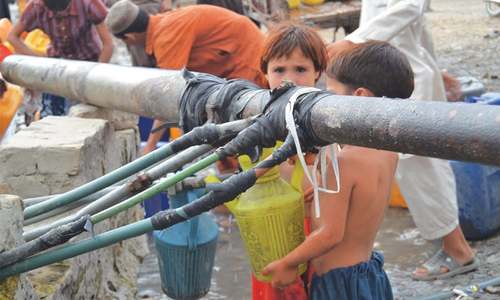ISLAMABAD: More than 1.4 billion jobs, or 42 per cent of the world’s total active workforce, are heavily water-dependent, according to a new report released by the United Nations to mark ‘World Water Day’ on Tuesday.
The ‘2016 World Water Development Report’ released by Unesco estimates that three of the four jobs worldwide are water-dependent and 1.2bn jobs, or 36pc of the active workforce, moderately water-dependent.
According to the report, water scarcity is likely to limit opportunities for economic growth and creation of decent jobs in the coming years and decades. Unless there is sufficient infrastructure to manage and store water, as is the case in many developed countries, its availability may vary significantly, leaving (parts of) countries ‘water scarce’ for extended periods.
Poor quality of water may not be fit for several uses and the cost of the required treatment may be a prohibiting factor, thus contributing to the burden of economic water scarcity.
Reduced water availability will further intensify competition among users, including agriculture, maintenance of ecosystems, human settlements and industry and energy production.
This will affect regional water, energy and food security and potentially geopolitical security, prompting migration at various scales. Potential impacts on economic activity and job market are real and possibly severe.
The report says climate change exacerbates threats to water availability and is expected to increase the frequency, intensity and severity of extreme weather events. Climate change will inevitably lead to the loss of jobs in certain sectors.
A proactive approach to adaptation via employment policies may offset some of these losses. At the same time, climate change is creating job opportunities of its own in terms of mitigation and adaptation activities.
The report emphasises that it is essential to plan water investments in conjunction with relevant sectors, such as agriculture, energy and industry in order to maximise positive economic and employment results.
Within a suitable regulatory framework, public-private partnerships offer prospects for much needed investment in water sectors, including building and operating infrastructure for irrigation and water supply, distribution and treatment.
In Asia and the Pacific, most of the industries driving economic growth depend on a reliable supply of freshwater for large parts of their production processes.
The report says that expanding economies will need increasing supplies of energy which, in turn, will require access to more water. There is tremendous potential to create employment opportunities in the region by increasing access to water in the agricultural sector.
There is also potential in the industry and service sectors to create and support water-dependent jobs, especially through the improvement of water efficiency, pollution control and wastewater usage, the report says.
The political will to set and implement water-related policy objectives that mutually support sustainable development and job creation is essential.
The allocation of water resources and the provision of water services to different economic sectors will largely dictate the growth potential for high quality jobs at country and local levels. Focusing on economic sectors that are most relevant for environmental sustainability and job creation will prove to be the ultimate key to success.
Published in Dawn, March 23rd, 2016














































